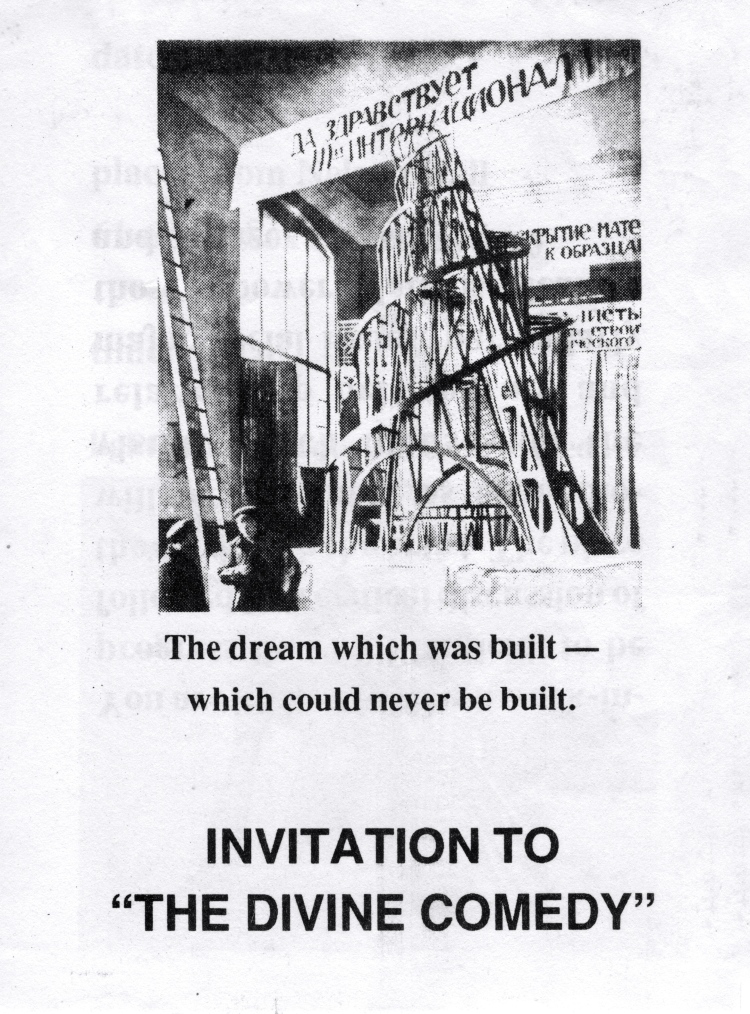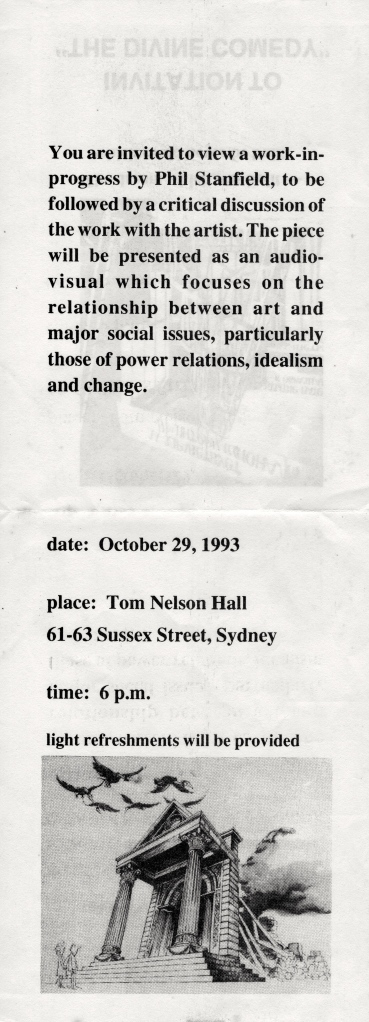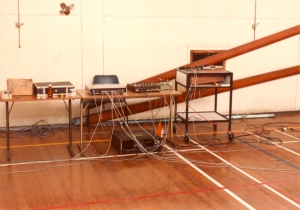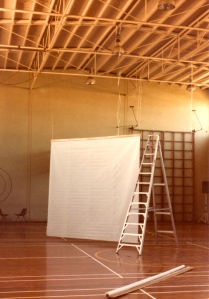I presented my work-in-progress in the auditorium of the Waterside Workers’ Federation of Australia building in Sydney using two projectors, a couple of hundred slides and my own audio. The work was programmed.
Below are photos taken in a gymnasium of my work-in-progress in 1984, using three screens of architect’s paper hung radiating from the centre with two projectors focused on each screen, hundreds of slides, lighting and my own audio (yes folks, that is a reel-to-reel you can see!). The work was programmed.
Some performers were involved at this stage but, inspired by mass performances in the Soviet Union after the 1917 Revolution, by the mass annual performances at night by T.R.E.E. (Theatre Reaching Environments Everywhere) at Wattamolla Beach in the Royal National Park south of Sydney (which involved many people, including the residents and tradespeople of Bundeena, a township situated at the north end of the National Park), and by the potential for knowledge in mass creativity, I always intended to eventually work with many performers, artists, and people from a range of cultural backgrounds.
Rather than the piece being mine, I intended it to be a means.
An aircraft hangar was suggested for that level of development but, to use an obvious pun, the work never got off the ground.









Fantastic! “[Art] conveys the highest aspirations of a social structure and its age.” Just brilliant, can’t imagine why this project, rising on the winds of art, politics, and entertainment, didn’t “take off” from that hangar and circumnavigate the globe. If promoted in my town, I’d participate!
LikeLike
Hi Robert, I appreciate that you comment with feeling! I think it didn’t ‘take off’ because the time was not right for such a thoroughly political work (going from capitalism> through revolution> to socialism.
Such a work would require a great deal of idealism (as found expression in the art of the Russian Revolution). What exists now is a great deal of individualism, cynicism (indicative of capitalism in decline) and an acceptance of the chant of the capitalists’ ideologues (repeat a lie often enough and people will accept it) – that socialism has ‘had it’.
But, particularly post-GFC, the door for profound change is opening again, and everybody either knows or senses it.
One of the problems I experienced when I invited performers to become involved is that while some were willing to do so, they waited for me to direct them – which I was not going to to (because it would have gone counter to the spirit I wanted the work to have and counter to the creative and learning potential for all involved I believe[d] it could have).
One girl refused to become involved, fleeing from a preview, because she said a number of the images (photos) depicting capitalism were too violent. I asked her if she felt the same way about the violence she watches on TV and at the movies and she had no answer.
Best regards, Phil
LikeLiked by 1 person
“The Girl Who Fled” would make a great novel, with your anecdote as the opening chapter. A coming-of-age allegory for how people are so often in terror of responsibility — for themselves, their communities, economies, governments, etc. It’s easier to accept the slavery of corporatocracy than it is to strike out into territory that seems uncharted.
LikeLiked by 1 person
Robert, if you write that novel, would you let me know – I want to find out what happened to her. Best regards, Phil
LikeLike
I love your manifesto at the beginning. I’m in agreement. Also, you always keep a spark of optimism, a little piece of hope for the future. Oh and when I said ‘sophisticated’ in some reference to philosophy that was never intended as criticism. On the contrary — to me, sophistication is a virtue because it means you see things like they are and have an understated, yet knowing, response — esthetic, style-wise, thinking-wise. All of it.
Like a wise-guy but funny, less is more, slightly sardonic.
LikeLike
Hi Austin, thanks for your response. I used to wonder ‘What is the most important thing for a person to have?’ and for a long time I thought it is health. But now I think it is hope – because (in my view) without hope, there is no true health. The hope of which I process is not a mere abstract projection into the future (unreliable and vulnerable) but one based on an understanding of objective reality, of how matter works. A prime example of this is that objective reality is primary to consciousness and thought.
So you have the capitalist ideologues saying ‘After the failures of communism and the collapse of the Soviet Union, socialism is dead. No-one thinks about it now.’
But when one appreciates that the movement of matter is the fundamental determinant of thought, that the movement of matter is reflected in thought, one appreciates that people are not ‘radicalised’ simply because they choose to be over a cup of coffee or tea, but because they are driven to be (by objective circumstances). The knowledge of that gives me hope in the future.
On your use of ‘sophisticated’, what generated my response was (as with The Spellchecker Incident) a guilt-plagued conscience. I am being guided through this, three times a week, at confession.
Best regards, Filippo
LikeLike
the experience of ‘hope’ is an endorphin release. it makes you feel better but is not, in my opinion, a causative factor in the future. Can we just agree to disagree on this?
To me there’s no logic to hope. I can ‘hope’ the Yankees will win the World Series but that will not affect the outcome. humans are much LESS in control than they think they are. the larger picture is inter-dimensionality.
my experience has taught me that we’re living in a hologram and there’s no way we’re calling the shots.
still, I hope the Yankees at least win the American League Pennant (just kidding.)
LikeLike
The Marxist (I am not one) would entirely agree with you that hope is not a causative factor re- the future. In my reply to you I referred to hope based on knowledge (thereby acknowledging and utilising the inescapable relation between emotion and reason).
Even with regard to the Yankees winning the World Series, hope can be based on knowledge (re- how skilled the team members are in relation to the members of the team they will be playing, the history of the team overall, the history between the two teams – if the Yankees are in the grand final, etc.).
What is your response to this: many years ago I was unemployed and in bed. I remember being very aware of what a beautiful day it was outside but I did not want to get out of bed. I remember this after all these years because at the time, I wondered why I so definitely didn’t want to get out of bed and on such a beautiful day. What was keeping me there?
My very clear thought in response was that I felt no hope. I have noticed many times when I have got out of bed to get on with my day, it has been at precisely that point when I felt a surge of hope (because I had the thought that there are other decent people in the world who will acknowledge me, be honest with me etc.).
I have done a lot of reading about (ocular) vision and I believe that when we are emotionally ‘closed down’ so our vision ‘closes down’ and when we feel ‘positive’/hope etc. our vision also is ‘bright’ and opens up etc.
What do you think?
LikeLiked by 1 person
You have so much background in and knowledge about Marxism and Socialism — that you can connect ‘hope’ and Marxism, as an example. Given that I have none of that frame of reference, I’m not sure how on-target my response can be. Having said all that . . . it seems to me that we’re talking apples and oranges. The apples being all aspects of political thought, seeing humans as being, above all, part of society and a group — when I would say humans are, above all, individual pools of consciousness the powers that be try to keep dumb as possible — and the oranges the belief that thoughts affect outcomes. I believe that is delusional. It’s a prickly subject for me living, as I do, in San Miguel where overheard cocktail party lines include stuff like ‘I don’t accept any limitations on myself’ or ‘I totally get that manifesting thoughts is real.’ I think that’s all greeting card ‘philosophy’ — that it’s based on wishful thinking in the same way that believing the universe is ‘made out of love’ is.
Your experience of getting out of bed that day you didn’t have a job or anything to do or anything to feel particularly good about, was, in my opinion, an example of how doing something can make you ‘feel’ better than lying around in bed feeling sorry for yourself. But I don’t think it indicates anything like a great truth about the planet or you or humans. It was, likely, a mystical experience that had meaning for you (which Wittgenstein states absolutely are real for the individual but have not greater ‘logical’ meaning) but which relies for its reality on things which cannot be discussed logically. So, to go back to my first point, I think hope is what happens when you tell yourself something to cheer yourself up and it’s frequently a more pleasant way to get thru the life than doing the opposite but that, as a concept, it has no effect whatsoever on the playing out of your ‘fate.’ It’s true that when you’re smiling the world smiles with you which is, yet again, endorphin release, but I don’t think that smile is gonna keep you from getting hit by a bus or getting cancer or having your kid die.
Make sense? What do you think?
Austin
LikeLike
Hi Austin, I’ve just got up (I haven’t run a check on my hope meter yet). This is just to state that I will reply to your comment later today – I need to think about it. But one point – you previously commented about agreeing to disagree. It’s at precisely that point that philosophy begins. Best wishes, Filippo
LikeLike
Hi Filippo, it’s great to see – your expression and transformation. Tach.
LikeLike
Hi Tach, thanks and best wishes to you.
LikeLike